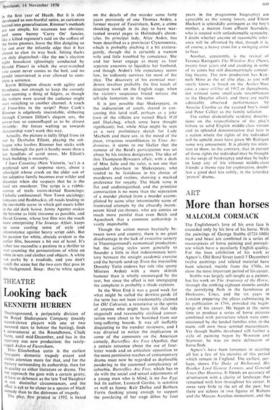THEATRE
Looking back _
KENNETH HURREN
Theatregoround, a peripatetic division of the Royal Shakespeare Company (mainly second-eleven players with one or two seasoned stars to bolster the batting), finds a caravanserai at the Roundhouse, Chalk Farm, until mid-December, and has in the repertory one new production: the rarely- staged Arden of Faversham. This. Elizabethan curio is the earliest bourgeois domestic tragedy extant and claims attention more for that, and for the mystery surrounding its authorship, than for its quality as either literature or drama. The Rsc approach the gore with a certain gaiety, at least as debonair as the late Tod Slaughter ITS not dissimilar circumstances, and the effect is apt to be closer to a species of black Comedy than to the distresses of tragedy.
The play, first printed in 1592, is based on the details of the murder some forty years previously of one Thomas Arden. a former mayor of Faversham, Kent, a crime shocking enough in its day to have war- ranted several pages in Holinshed's chron- icles. Its principal lady, Alice Arden, has been described as a provincial Clytemnestra, which is probably pitching it a bit extrava- gantly, though she is certainly a wanton wife and little troubled by conscience. She and her lover engage as many as four separate assassins to liquidate her husband, and though Arden's life expectancy seems low, he tediously survives for most of the play. The discovery of his eventual mur- derers involves probably the first touch of detective work on the English stage, when the victim's suspicious friend notices the tell-tale footprints in the snow.
It is just possible that Shakespeare, in the indiscretion of youth, shared in con- cocting this lurid stuff, perhaps as a joke (two of the villains are named Black Will and Shakebag, which some have thought significant); but, while Alice might be seen as a very preliminary sketch for Lady Macbeth and there are, in the mood of the piece, vivacious resemblances to Titus An- dronicus, it seems to me likelier that the rumour of the Bard's participation was set about by his tireless denigrators. The idea of this Thompson-Bywaters affair, with a dash of Miss Julie and the valet, is not one that appealed elsewhere to Shakespeare, who tended to be fastidious in his choice of murderers and victims, showing a marked preference for royalty. The blank verse is flat and undistinguished, and the primitive construction is no more than the separation of a murder plotted from a murder accom- plished by scene after interminable scene of frustrated attempts by the absurdly incom- petent hired cut-throats, who are comics so much more painful than even Belch and Aguecheek that a common authorship is vastly improbable.
Though the action moves hectically be- tween town and country, there is no great disadvantage in the lack of evocative scenery in Theatregoround's economical production; but the acting styles seem generally to flounder a little in that indeterminate terri- tory between the straight academic exercise and the berserk send-up. Even the irresistible Dorothy Tutin endows her role (the sporty Mistress Arden) with a more skittish humour than is wholly encouraged by the text, but since the effect is not unengaging the complaint is probably a shade captious.
In the West End it was a good week for what might be called the derriere-garde (if the term has not been irredeemably claimed for Oh! Calcutta), a restorative to the spirits of anyone who might have felt that tidy stagecraft and reasonably civilised conver- sation were about to be banished from our long-suffering boards. It was all ineffably disquieting to the trendier reviewers, and I was diverted to notice the implication in some of the comments on the American comedy, Butterflies Are Free (Apollo), that a certain reticence about the use of four- letter words and an articulate opposition to the more permissive reaches of contemporary drama must now be regarded as deplorable pandering to the cocooned complacency of suburbia. Butterflies Are Free, which has to do with the social and sexual adjustments of a young man who is blind, is no Joe Egg; but its author, Leonard Gershe, is sensitive as well as funny. Keir Dullea and Barbara Ferris (looking young enough to support the postdating of her stage debut by four
years in the programme biography) are agreeable as the - young lovers, and Eileen Heckart is splendidly astringent as the boy's mother, a matron from affluent Scarsdale, who is treated with unfashionable sympathy. I doubt whether anyone of reasonable toler- ance will be affronted by that, though it is, of course, a heavy cross for a swinging critic to bear.
Another, apparently, is the revival of Terence Rattigan's The Winslow Boy (New), twenty-four years old and creaking in some of its joints but still disconcertingly compel- ling theatre. The new production has Ken- neth More as the KC (the play, as you will surely know, is based on the Archer-Shee case, a cause celAre of 1912 or thereabouts, not without some small-scale resemblances to the Dreyfus affair), and there are really admirably observed performances by Annette Crosbie as the accused boy's sister and Peter Cellier as the family solicitor.
The rather disdainfully sardonic disserta- tions on the respectfulness of the play's tribute to solid English middle-class virtues and its splendid demonstration that here is a nation where the rights of the individual will be upheld, must have given Mr Rattigan some wry amusement. It is plainly his inten- tion to show, to the contrary, that in pursuit of those rights the individual may be brought to the verge of bankruptcy and may be lucky to keep any of his virtuous middle-class friends: a theme ripe for exploration. doubt- less a good deal less subtly, in the latterday 'protest' drama.








































 Previous page
Previous page